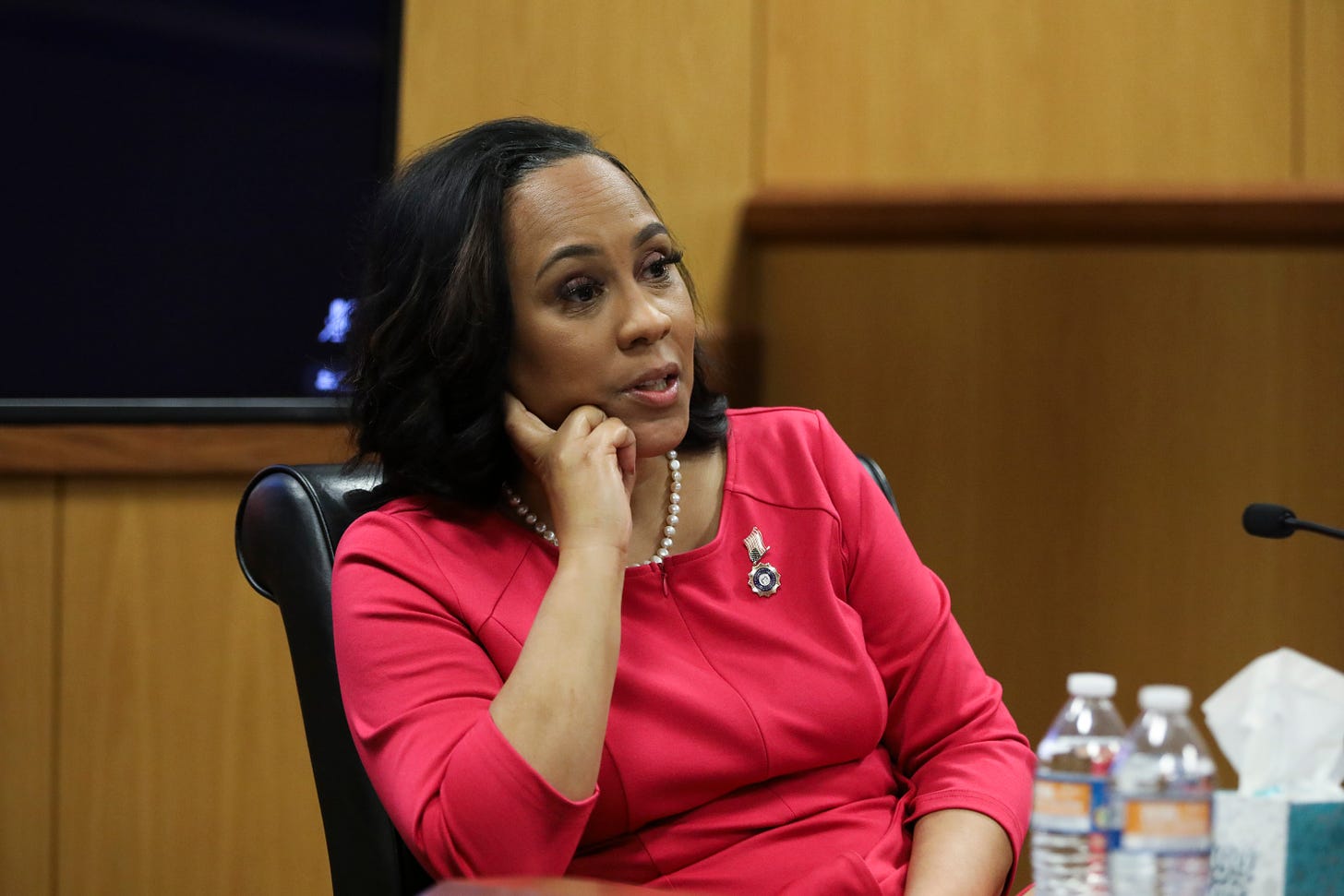
Fani Willis Admonished, But Trump Prosecution Continues
Ruling and a resignation should end the sideshow over the Fulton County D.A.’s relationship with a colleague.

ON FRIDAY, THE JUDGE OVERSEEING the Fulton County, Georgia prosecution of Donald Trump issued an eye-popping opinion rejecting efforts by Trump and a handful of his co-defendants to get District Attorney Fani Willis tossed from the prosecutor’s chair. This is a huge win for the rule of law, because if the defendants had succeeded, replacing Willis was an iffy proposition. Although Willis won the motion, Judge Scott McAfee took pains to make crystal clear that she behaved very badly. Ultimately, the judge gave Willis an ultimatum: either Nathan Wade goes or Willis does. Wade—the coworker with whom Willis had the romantic relationship that prompted this entire sideshow—withdrew from the case shortly after the judge issued his ruling.
Meanwhile, on Wednesday, McAfee dismissed six of the forty-one criminal counts in the case, including three pending against Trump. The judge left Willis the choice of either securing a more detailed superseding indictment to bring those six counts again or just moving forward on the counts that are left. Presumably she will choose to proceed, since the dismissed counts are relatively minor, the main racketeering count remains intact, and there is little value in further delay. Either way, the case won’t go to trial before November. But unlike the two federal indictments against him, this case in state court won’t magically disappear if Trump wins the White House. That’s the good news. In the meantime, Willis must contend with the judge’s admonition that she tarnished both herself and the public’s perception of the integrity of the underlying case.
To recap: Defendant Michael A. Roman filed a motion to dismiss the Georgia election interference indictment and to disqualify Willis after his lawyers learned that she was engaged romantically with Wade, a top lieutenant whom she hand-picked to help prosecute the former president and his co-defendants. McAfee held a multi-day evidentiary hearing to test the scope of their relationship, and to determine whether the defendants could prove that an actual conflict of interest existed which required either dismissal of the entire indictment or the firing of Willis. The evidence showed that the couple took multiple vacations together while working on the racketeering case, that Wade often paid for Willis’s half, but that Willis paid him back—mostly in cash. Under Wade’s employment agreement with the Georgia D.A., he billed $250 per hour for his work. The defendants’ claim was that Wade had an incentive to rack up more hours to take home a bigger paycheck, and that Willis was also motivated by that arrangement because it meant more trips for her on the Georgia taxpayers’ dime.
McAfee rejected these arguments both as a matter of law and fact. Prosecutors can date each other and work on the same case without an actual conflict of interest, he reasoned, and although nobody kept an accounting of who paid what, the evidence suggested that at the end of the day, Willis may only still owe Wade a few hundred bucks. What’s more, the judge wrote, Willis has been doggedly pursuing the case and asking for a quick trial date over the defendants’ objection (including Trump). If she meant to drag it out for more vacation dollars, it would translate into delays in the prosecution. The legal test for an actual conflict of interest was accordingly not satisfied. Perhaps even more importantly, there was zero evidence presented that the Wade-Willis relationship actually impacted or prejudiced the rights of the defendants in the criminal case which, after all is said and done, are paramount.
THEN JUDGE MCAFEE REALLY got going.
Although there was no actual conflict of interest, he added, Georgia appeals courts have recognized that even an “appearance of impropriety” can justify disqualification of a prosecutor, too. That did exist here—as I noted here in The Bulwark last month—although disqualifying Willis altogether wasn’t necessary so long as Wade is relieved of his duties.
Implicit in this part of the opinion is McAfee’s belief that Willis vastly exacerbated her predicament by digging into what she had done once the relationship became public. “Even if the romantic relationship began after . . . Wade’s initial contract in November 2021,” he wrote, “the District Attorney chose to continue supervising and paying Wade” and “allowed the regular and loose exchange of money between them.” Had Willis asked for Wade’s resignation the moment the scandal broke, McAfee might not have been so harsh on her. Instead, he emphasized that Willis stated publicly that her relationship with Wade was only “cemented” and became “stronger than ever.” In the meantime, Wade seemed willing to conceal it. According to McAfee, “an outsider could reasonably think that the District Attorney is not exercising her independent professional judgment totally free of any compromising influences.”
Worse, McAfee wrote, “an odor of mendacity remains.” In particular, “reasonable questions about whether the District Attorney and her hand-selected lead [prosecutor] testified untruthfully about the timing of their relationship further underpin the finding of an appearance of impropriety and the need to make proportional efforts to cure it.” Ouch. McAfee went on to call Willis’s bullish testimony under oath “unprofessional,” and took issue with her prepared speech at an Atlanta church on January 14, 2024, in which, “instead of attributing the criticism [of her] to a criminal accused’s general aversion to being convicted and facing a prison sentence, the District Attorney ascribed the effort as motivated by ‘playing the race card,’” frequently referring to Wade as “the ‘black man.’” “The effect of this speech,” the judge concluded, was “to cast racial aspersions at an indicted Defendant’s decision to file this pretrial motion.”
This is intense stuff for any lawyer to hear from a sitting judge. For a prosecutor to get hit with it—when they “are expected to assume a role beyond a mere advocate for one side and must make decisions in the public’s interest”—is potentially career-ending. It’s a good thing that didn’t happen here. Trump must go to trial in Georgia, and Willis is the only one positioned to do it.
Meanwhile, McAfee handled this difficult mess admirably. For anyone who assumes that American courts are always playing politics, he proved them wrong. No one, he emphasized, is above the law.
















